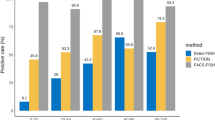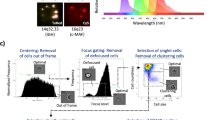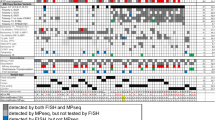Abstract
Philadelphia (Ph) chromosome or the bcr/abl fusion gene is the hallmark of chronic myeloid leukemia (CML) and serves as a prognostic marker during its treatment. Its detection has been primarily done by karyotype analysis of bone marrow cells. The major limitation of the karyotypic technique is an absolute need for metaphases, often difficult to obtain in an appropriate number in patients under therapy. Fluorescence in situ hybridization (FISH) is a sensitive and quantitative method to detect the bcr/abl fusion gene in cells in both metaphase and interphase. Using M-bcr and abl probes, we performed the interphase FISH in the peripheral blood of 30 healthy volunteers and in 20 hematologically normal bone marrow samples. False-positive cells were detected in 2.7 ± 0.7% (mean ± standard deviation) and 2.3 ± 0.7% among 500 cells, respectively. Then we tested 31 patients with CML at various stages of disease on 50 occasions. Although there was a good correlation between the percentage of FISH-positive cells in the peripheral blood and that in the bone marrow (r = 0.977), between the percentage of FISH-positive cells in the peripheral blood and that of Ph chromosome in the bone marrow (r = 0.841), and between the percentage of FISH-positive cells and that of Ph chromosome in the bone marrow (r = 0.933), the limits of agreement in each group were not small, and thus the peripheral blood FISH test can not be interpreted as the same method with conventional karyotyping. Additionally, we could easily rule out CML in 15 individuals with leukocytosis without performing bone marrow aspiration. The present study indicates that FISH analysis in the peripheral blood is a simple and reliably sensitive test for the detection and quantitative monitoring of the M-bcr/abl fusion gene in CML in routine clinical practice, although this can not entirely replace karyotype analysis of bone marrow cells.
This is a preview of subscription content, access via your institution
Access options
Subscribe to this journal
Receive 12 print issues and online access
$259.00 per year
only $21.58 per issue
Buy this article
- Purchase on Springer Link
- Instant access to full article PDF
Prices may be subject to local taxes which are calculated during checkout
Similar content being viewed by others
Author information
Authors and Affiliations
Rights and permissions
About this article
Cite this article
Yanagi, M., Shinjo, K., Takeshita, A. et al. Simple and reliably sensitive diagnosis and monitoring of Philadelphia chromosome-positive cells in chronic myeloid leukemia by interphase fluorescence in situ hybridization of peripheral blood cells. Leukemia 13, 542–552 (1999). https://doi.org/10.1038/sj.leu.2401383
Received:
Accepted:
Published:
Issue Date:
DOI: https://doi.org/10.1038/sj.leu.2401383
Keywords
This article is cited by
-
FISH for BCR-ABL on interphases of peripheral blood neutrophils but not of unselected white cells correlates with bone marrow cytogenetics in CML patients treated with imatinib
Leukemia (2003)
-
Correlation between BCR-ABL expression and tumor burden is restricted to the transition from minor to major cytogenetic response in interferon treated CML patients
Pathology & Oncology Research (2003)
-
Detection of the BCR-ABL Gene by Interphase Fluorescence In Situ Hybridization (iFISH) in Chronic Myelogenous Leukemia Patients after Hemopoietic Stem Cell Transplantation: The Feasibility of iFISH Monitoring of Therapeutic Response in Peripheral Blood
International Journal of Hematology (2002)
-
Detection and quantification of residual disease in chronic myelogenous leukemia
Leukemia (2000)



